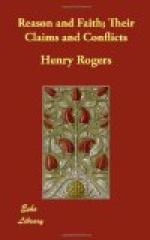must be by this time ashamed of that ragged regiment
of shallow thinkers, and obscure writers and talkers
who at present infest our literature, and whose parrot-like
repetition of their own stereotyped phraseology, mingled
with some barbarous infusion of half Anglicised German,
threatens to form as odious a cant as ever polluted
the stream of thought or disfigured the purity of
language. Happily it is not likely to be more
than a passing fashion; but still it is a very unpleasant
fashion while it lasts. As in Johnson’s
day, every young writer imitated as well as he could
the ponderous diction and everlasting antitheses of
the great dictator as in Byron’s day, there
were thousands to whom the world ‘was a blank’
at twenty or thereabouts, and of whose dark imaginings,’
as Macaulay says, the waste was prodigious; so now
there are hundreds of dilettanti pantheists’,
mystics and sceptics to whom everything is a ‘sham,’
an ‘unreality’; Who tell us that the world
stands in need of a great ‘prophet,’ a
seer,’ a ’true prophet’, a large
soul,’ a god-like soul,’*—who
shall dive into ’the depths of the human consciousness,’
and whose ‘utterances’ shall rouse the
human mind from the ‘cheats and frauds’
which have hitherto everywhere practised on its simplicity.
The tell us, in relation to philosophy, religion,
and especially in relation to Christianity, that all
that has been believed by mankind has been believed
only on ‘empirical’ grounds; and that
the old answers to difficulties will do no longer.
They shake their sage heads at such men as Clarke,
Paley, Butler, and declare that such arguments as
theirs will not satisfy them.,—We are glad
to admit that all this vague pretension is now but
rarely displayed with the scurrilous spirit of that
elder unbelief against which the long series of British
apologists for Christianity arose between 1700 and
1750; But there is often in it an arrogance as real,
though not in so offensive a form. Sometimes the
spirit of unbelief even assumes an air of sentimental
regret at its own inconvenient profundity. Many
a worthy youth tells us he almost wishes he could
believe. He admires, of all things, the ’moral
grandeur’—the ‘ethical beauty’
of many parts of Christianity; he condescends to patronize
Jesus Christ, though he believes that the great mass
of words and actions by which alone we know anything
about him, are sheer fictions or legends; he believes—gratuitously
enough in this instance, for he has no ground for
it—that Jesus Christ was a very ‘great
man’ worthy of comparison at least with Mahomet,
Luther, Napoleon, and ’other heroes’;
he even admits that happiness of a simple, child-like
faith, in the puerilities of Christianity—it
produces such content of mind! But alas! he cannot
believe—his intellect is not satisfied—he
has revolved the matter too profoundly to be thus
taken in; he must, he supposes, (and our beardless
philosopher sighs as he says it) bear the penalty of
a too restless intellect, and a too speculative genius;
he knows all the usual arguments which satisfied Pascal,
Butler, Bacon, Leibnitz; but they will do no longer:
more radical, more tremendous difficulties have suggested
themselves, ’from the ‘depths of philosophy,’
and far different answers are required now!+




